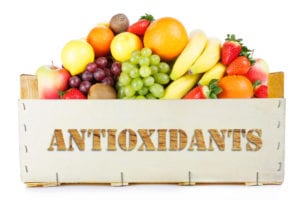Written by Greg Arnold, DC, CSCS. Supplementation with lutein and lycopene “significantly inhibited” gene expression in the skin after ultraviolet radiation exposure compared to the placebo group.
 Two antioxidants consistently shown to elicit significant health benefits are lutein and lycopene. An intake of 12 milligrams of lutein per day helps maintain eye health 1, 30 milligrams of lycopene per day benefits bone health 2 and 70 milligrams per day helps maintain healthy levels of cholesterol and inflammation 3.
Two antioxidants consistently shown to elicit significant health benefits are lutein and lycopene. An intake of 12 milligrams of lutein per day helps maintain eye health 1, 30 milligrams of lycopene per day benefits bone health 2 and 70 milligrams per day helps maintain healthy levels of cholesterol and inflammation 3.
Now a 2016 study 4 suggests that these two supplements together may benefit skin health. The two-arm, double-blind, placebo-controlled, cross-over study involved 65 healthy volunteers (52 males, 13 females) aged 33 to 48. The subjects started with a 2-week washout period. Then they were assigned to a group that received 10 mg of lutein per day or a placebo for 12 weeks or a group that received 5 mg of lycopene or a placebo for 12 weeks. There was another 2-week washout period and they switched to the other supplement or placebo for another 12 weeks.
At the beginning and at the end of each treatment phase, subjects were exposed to a solar simulator to receive ultraviolet-A and ultraviolet-B radiation 5,6, and 24 hours later, biopsies were taken from untreated, UVB/A- and UVA1 irradiated skin to analyze gene expression. Subjects provided blood samples after the washout and the treatment phases to measure their antioxidant levels. They also provided skin samples to assess skin health by measuring the effect of gene expression 7,8.
HO1 (heme oxygenase-1 ) is an indicator gene for oxidative stress 9, MMP-1 (matrix metalloproteinase-1) is involved in collagen breakdown and photo-aging of human skin 10, and ICAM-1 (intercellular adhesion molecule) plays an important role in skin inflammation 11.
By the end of the study, the researchers noted that both lutein and lycopene “significantly inhibited” gene expression in the skin after ultraviolet radiation exposure compared to the placebo group. Specifically, activity of three different genes in the skin (ICAM-1, HO-1, and MMP-1) were significantly lower in both the lutein and lycopene groups compared to the placebo group (p < 0.05).
The significance of this decrease is that increased activity of ICAM-1, HO-1, and MMP-1 has been shown to be a marker of decreased skin health through sun-induced skin aging (“photoaging”), skin cancer from sun exposure (“photocarcinogensis”), and skin rashes from sun exposure (“photodermatoses”) 9-11.
For the researchers, “we suggest that oral supplementation with lycopene and lutein may be efficient in inhibiting UVA1 radiation-induced oxidative stress responses in general and gene regulatory events involved in photoaging, photocarcinogenesis and photodermatoses specifically.”
Source: Grether-Beck S. Molecular evidence that oral supplementation with lycopene or lutein protects human skin against ultraviolet radiation: Results from a double-blinded, placebo-controlled, cross-over study. Br J Dermatol 2016 Sep 23. doi: 10.1111/bjd.15080. [Epub ahead of print]
© 2016 The Authors. British Journal of Dermatology
Posted December 5, 2016.
Greg Arnold is a Chiropractic Physician practicing in Hauppauge, NY. You can contact Dr. Arnold directly by emailing him at PitchingDoc@msn.com or visiting his web site at www.PitchingDoc.com.
References:
- Ma L, Lin XM, Zou ZY, Xu XR, Li Y, Xu R. A 12-week lutein supplementation improves visual function in Chinese people with long-term computer display light exposure. Br J Nutr. 2009;102(2):186-190.
- Mackinnon ES, Rao AV, Josse RG, Rao LG. Supplementation with the antioxidant lycopene significantly decreases oxidative stress parameters and the bone resorption marker N-telopeptide of type I collagen in postmenopausal women. Osteoporosis international : a journal established as result of cooperation between the European Foundation for Osteoporosis and the National Osteoporosis Foundation of the USA. 2011;22(4):1091-1101.
- McEneny J, Wade L, Young IS, et al. Lycopene intervention reduces inflammation and improves HDL functionality in moderately overweight middle-aged individuals. J Nutr Biochem. 2013;24(1):163-168.
- Grether-Beck S, Marini A, Jaenicke T, Stahl W, Krutmann J. Molecular evidence that oral supplementation with lycopene or lutein protects human skin against ultraviolet radiation: results from a double-blinded, placebo-controlled, crossover study. Br J Dermatol. 2017;176(5):1231-1240.
- Vielhaber G, Grether-Beck S, Koch O, Johncock W, Krutmann J. Sunscreens with an absorption maximum of > or =360 nm provide optimal protection against UVA1-induced expression of matrix metalloproteinase-1, interleukin-1, and interleukin-6 in human dermal fibroblasts. Photochemical & photobiological sciences : Official journal of the European Photochemistry Association and the European Society for Photobiology. 2006;5(3):275-282.
- Tzaneva S, Seeber A, Schwaiger M, Honigsmann H, Tanew A. High-dose versus medium-dose UVA1 phototherapy for patients with severe generalized atopic dermatitis. J Am Acad Dermatol. 2001;45(4):503-507.
- Marini A, Grether-Beck S, Jaenicke T, et al. Pycnogenol(R) effects on skin elasticity and hydration coincide with increased gene expressions of collagen type I and hyaluronic acid synthase in women. Skin Pharmacol Physiol. 2012;25(2):86-92.
- Marini A, Jaenicke T, Grether-Beck S, et al. Prevention of polymorphic light eruption by oral administration of a nutritional supplement containing lycopene, beta-carotene, and Lactobacillus johnsonii: results from a randomized, placebo-controlled, double-blinded study. Photodermatol Photoimmunol Photomed. 2014;30(4):189-194.
- Nisar MF, Parsons KS, Bian CX, Zhong JL. UVA irradiation induced heme oxygenase-1: a novel phototherapy for morphea. Photochemistry and photobiology. 2015;91(1):210-220.
- Krutmann J. Skin Aging. Berlin: Springer; 2006.
- Vandergriff T. Fitzpatrick’s Dermatology in General Medicine. Mcgraw Hill; 2012.
